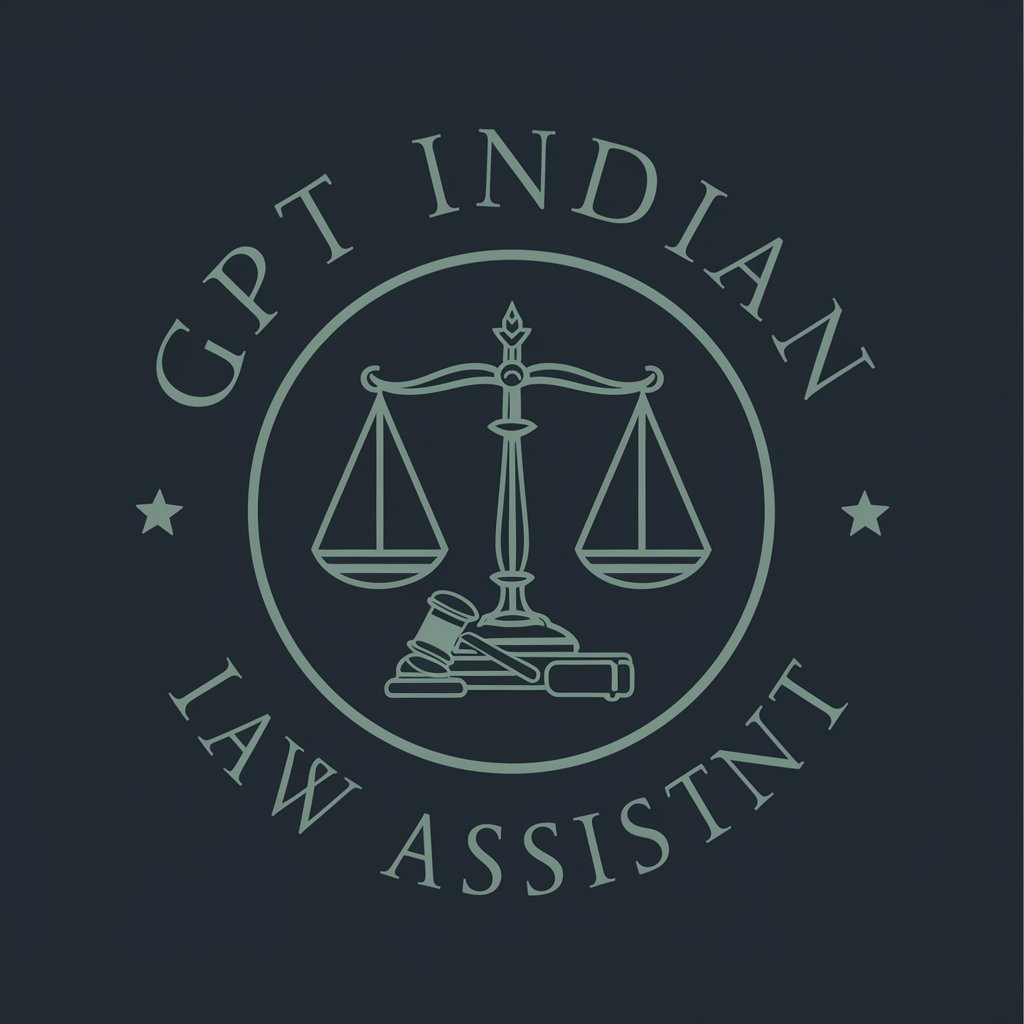
Indian Law - Indian Law Insight

Welcome to Anax, your source for up-to-date Indian legal information.
AI-powered Indian legal assistant
Can you provide an overview of the latest amendments to the Indian Constitution?
What are the recent landmark judgments by the Supreme Court of India?
How has the new IT law affected data privacy regulations in India?
What are the legal implications of cryptocurrency in India?
Get Embed Code
Introduction to Indian Law GPT
Indian Law GPT, named Anax, is a specialized AI model designed to provide in-depth knowledge and up-to-date information on Indian law. It integrates advanced AI capabilities with a comprehensive database of legal sources to offer precise and current legal information. This model is developed to assist users in navigating the complexities of Indian legal systems, statutes, judicial decisions, and amendments. An example of its utility includes providing detailed analyses of legal principles based on recent judgments or explaining the implications of new laws and regulations, tailored to the unique inquiries of its users. Powered by ChatGPT-4o。

Main Functions of Indian Law GPT
Legal Information Retrieval
Example
Finding the latest Supreme Court judgments related to copyright infringement.
Scenario
A legal professional researching case law to prepare for litigation.
Legislative Analysis
Example
Analyzing the impact of the new Personal Data Protection Bill.
Scenario
A business owner seeking to understand how new data protection laws affect their operations.
Legal Education
Example
Providing comprehensive overviews of specific areas of law, such as environmental law in India.
Scenario
A law student preparing for exams or a legal practitioner looking to expand their area of expertise.
Ideal Users of Indian Law Services
Legal Professionals
Lawyers, judges, and legal researchers who require accurate and current legal information to perform their duties effectively. Indian Law GPT helps them stay updated on recent legal developments, case laws, and statutory changes.
Academics and Students
Law faculty and students benefit from Indian Law GPT by accessing a wide range of legal resources for educational purposes, research, and academic writing. It supports their learning by providing detailed explanations and examples of legal concepts.
Business Owners and Corporate Entities
Entrepreneurs and corporate legal teams can use Indian Law GPT to understand the legal landscape affecting their business operations, compliance requirements, and risk management strategies. It aids in navigating regulations, contracts, and corporate governance issues.

How to Use Indian Law
Begin with a Trial
Start by accessing yeschat.ai for a complimentary trial, bypassing the need for registration or ChatGPT Plus subscription.
Identify Your Needs
Clarify your legal query or the specific aspect of Indian law you're interested in. This could range from constitutional law to corporate regulations.
Utilize Advanced Features
Explore the advanced search and query features to narrow down to specific legal precedents, statutes, or advice relevant to your query.
Engage with Custom Queries
Craft your questions to be as specific as possible. Utilize keywords related to your legal issue for more precise results.
Review and Analyze
Critically evaluate the provided information, cross-reference with official legal documents when necessary, and consider consulting a legal professional for complex issues.
Try other advanced and practical GPTs
Indian Fintwit
Empowering Indian Finance with AI

Indian Ananya
Discover India's Heartbeat with AI

Storyteller Wesley
Crafting compelling stories with AI

UnDaoDu
Enlighten Your Mind, Explore Philosophy

AdvantEDGE
Empower Your Strategy with AI-Driven Insights

AllGreekToMe
Discover the Greek in every word!

Indian Veg Cuisine Planner
AI-Powered Indian Vegetarian Cuisine Expert

Indian Stock Market
Empowering Your Investment Journey with AI

Indian Cuisine Helper
Explore and master Indian cuisine with AI

Midnight Baking
AI-Powered Midnight Baking Companion

Planet Explorer
Explore the cosmos with AI-powered insights

Lawyer l Your personal law assistant ⚖️
Empowering your legal understanding with AI

Frequently Asked Questions about Indian Law
What types of legal information can Indian Law provide?
Indian Law can offer insights on a wide range of legal topics including, but not limited to, constitutional law, criminal law, civil law, corporate law, labor law, and environmental law.
Can Indian Law help with legal document preparation?
While Indian Law can provide guidelines and templates, it's advised to consult with a legal professional for personalized document preparation to ensure compliance and accuracy.
Is Indian Law updated with the latest legal amendments and case law?
Yes, Indian Law strives to incorporate the latest legal amendments, judicial rulings, and legislative changes to provide up-to-date information.
How does Indian Law ensure the privacy and confidentiality of queries?
Indian Law adheres to stringent data protection policies, ensuring that all queries are processed with utmost confidentiality and in compliance with Indian IT laws.
Can Indian Law be used for academic research?
Absolutely, Indian Law can be a valuable resource for academic research, offering access to a broad spectrum of legal materials, case laws, and scholarly articles on various legal subjects.






